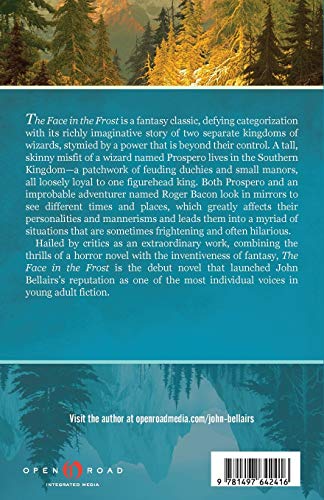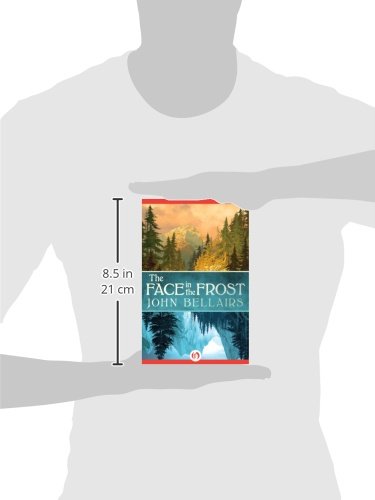



Full description not available
E**T
Prospero, but not the one you are thinking of
"The Face In The Frost" is a richly imaginative tale of two wizards, Prospero (not the one you're thinking of) and Roger Bacon, who must overcome a third wizard, the evil Melichus before he destroys them, and a lot of other folks as well.Even if you think you've heard this story before, you've never come across a variation like this one. The closest analogue that I can come up with is "Howl's Moving Castle" for its eccentricity, but 'Face' outdoes 'Howl' in this respect as well as in its fear quotient. The scary scenes approach M.R. James in intensity, and they are always preceded by migraine-like aura. Prospero senses that something is slightly off about the inn where he is staying. He is still trying to figure out what is bothering him at four in the morning:"Strange thoughts began to come to him now: locked boxes and empty rooms. Four dials and a black hole. Four cards and a blank. And a dead sound on the stroke of four. Why did that mirror bother him?"Quietly, Prospero got dressed, took his staff from the corner, and opened the door of his room. The hall was dark and silent...He lit [a candle] and tiptoed down the stairs to the place where the mirror hung. Prospero stared and felt a chill pass through his body. The mirror showed nothing-not his face, not his candle, not the wall behind him. All he saw was a black glassy surface."Prospero explores further and finds his landlady standing fully-clothed in her room, with a butcher knife in her hand. "In her slowly rising head were two black holes. Prospero saw in his mind a doll that had terrified him when he was a child. The eyes had rattled in the china skull. Now the woman's voice, mechanical and heavy: "Why don't you sleep? Go to sleep." Her mouth opened wide, impossibly wide, and then the whole face stretched and writhed and yawned in the faint light."Prospero manages to escape the inn and town that were nothing more than an elaborate trap set up by Melichus to destroy him. He is reunited with his friend, Roger Bacon and they continue on their quest to find and destroy Melichus's evil magic.There are delightfully eccentric set-pieces in 'Face:' a king who builds elaborate clock-works of the universe; a monk who collects strange plants; a talking mirror that divulges scores from a 1943 Cubs-Giants baseball game. I suspect the author wove his fantasy out of migraines, nightmares, and a love of mechanical oddities and spells that turn tomatoes into squishy red carriages. Prospero himself has a "cherrywood bedstead with a bassoon carved into one of the fat headposts, so that it could be played as you lay in bed and meditated...On a shelf over the experiment table was the inevitable skull, which the wizard put there to remind him of death, though it usually reminded him that he needed to go to the dentist."I'd better put an end to this review before I quote the whole book. It's so good, it pulls me in every time I open it---Enchanting, in the original sense of the word, and frightening, too.
A**O
Before Harry Potter, there was this lost gem from the typewriter of John Bellairs
"Unexplained noises are best left unexplained."Sound advice from John Bellairs' whimsical and secretive wizard Prospero ("not the one you are thinking of, either," Bellairs tells us), to his stoic housekeeper Mrs. Durfey - and incidentally, a pretty good rule of thumb for fantasy writers in general. Fortunately, it's a rule that Bellairs adheres to faithfully and effectively in The Face in the Frost.Good authors know that over-explaining is the death of storytelling, and John Bellairs was nothing if not a fellow who knew his work. He knew that readers like to use their imaginations, and despise stories that take us on a breathless, regimented forced-march. Many of us read to escape, and aren't willing to give up our time to a writer far too much in love with their own intricate plots, nor trade a mundane reality for a make-believe world that insists on controlling where our thoughts roam at all times.The Face in the Frost doesn't fall into the complexity trap. It is a deeply satisfying and undemanding read. Bellairs sketches out just enough of the oddly funny and frightening world of the North Kingdom and South Kingdom to help us form a picture, and relies on his matchless descriptive power to keep us wanting to see more. No need to lead us down the path, he simply maps it out and makes us want to follow it.Bellairs' storytelling gifts were many, and fully on display in The Face in the Frost, which I consider his finest book among a cohort of superb stories. He made his career as a moderately successful children's and young adult's writer, but all of his books have the sly, clever, grown-up humor of a man who tells everyone he writes for kids, but is really writing for himself and for anyone else who wants to get lost in bramble-filled woods pursued by strange, gibbering creatures, or explore the houses of wizards with their anachronistic curios, haunted cellars and bedsteads with bassoons carved into the headposts.John Bellairs never achieved the fame of later authors who followed the trail he blazed - one thinks of the Lemony Snicket books, with their dark humor and mysterious twists, or the Harry Potter child-wizard phenomenon, that has ensnared kids and adults alike. Which is a grand pity, because his work (often illustrated by the magnificently weird Edward Gorey), surpasses both in simplicity and quality (and above all, in sympathy - for his characters and readers alike). Bellairs was telling stories, not building a "brand" or helping create a publishing empire.
K**R
Strange Trip
This was a fairly good read although, at certain places in this book felt a little dated. Other than that I liked the book.
J**S
Splendid imagery greatly lifts the simple tale.
An odd confection. Two wizardly chums are subjected to magical attacks and journey off together to confront their mysterious enemy. Prospero (not that one) and Roger Bacon (yes, that one?) are wizards who hang around in the North and South Kingdoms, but also have access to the lands and history of Earth we are familiar with. Thus the book is peppered with indulgent anachronisms - Prospero tells his talking mirror to shut up and watch some late-night movies, for instance. This whimsical tone is light-hearted without ever quite making it to funny, and was a tad distracting to this reader. I also lost track of the plot a little - not that it's that complicated, but it is a little buried under the wonders, and I spent too long over this short book! My final complaint is that, not knowing the rules and constraints of magic in the depicted world, events appeared to me arbitrary and sometimes unsatisfying.However, above all that is the nature of the enchantment preying on our heroes. Here the author's imagination shines, depicting endless subtle transformations and spooky distortions in the world, such as the face that seems to appear in thawing frost on villagers' window-panes, or the shifting cloak hung in Prospero's cellar. The sense of the entire land becoming ever more bewitched and uncertain is palpable and chilling, reminding me of Algernon Blackwood's stories. For this admirable tapestry of growing supernatural menace, the tale is well worth reading.
W**F
Suprising, inventive and very short
Bellairs appears to have written mainly children's fiction. This was his one outing with adult fantasy. It features the adventures of two wizards - Prospero (who shares only his name with Shakespeare's) and Roger Bacon. They embark on a quest to discover who is sending sorcerous warnings to and attacks at Prospero and to find a warping evil book. They travel accross a cod-medieval world, similar to a jumbled up historic Britain.So far, so conventional. Where it exceeds these standard fantasy tropes is in Bellairs writing. It is intensely evocative. It has a great lightness of touch and a good eye for telling detail. As a result the book can change in tone from light whimsy to worrying horror from paragraph to paragraph.The result is something quite unusual - particularly for anyone used to reading recent modern fantasy. We have a book without any of the strained for significance of heroic fantasy, none of its dully mournful and dutiful heroes, no threat of crashing empires and armies on the march. Instead we have two - slightly silly but human - old men engaged on a journey to set things right again against a foe that might well be more powerful than them. Although the book was Bellairs response to reading Lord of the Rings, Prospero owes more to T. H. White's Merlin than Tolkein's Gandalf. And the book is very slim - you could read it in afternoon.Worth picking up.
M**G
Whimsical adult fantasy
The face in the frost is a curious book, with the whimsy of a children's novel while being decidely adult. It's a short book - the adventure of a couple of wizards in a fantasy world, as they search for an old book, try to work out who is trying to kill them, any why. Prospero (no, not that one the book tells us) and Roger Bacon (but yes, apparently that one) set off together, but are separated numerous times. Mixed in with all this is an old antogonist, who has laid various traps for our heroes - and some of the episodes are chilling indeed.Its not a truly great story, and struggles to decide how serious it is, but ends strongly and is worth reading, especially as it will not require much time or devotion to finish, and there is no sequel or series to commit to. As a last word, the old Ace edition paperback I have is illustrated in black and white - which seems odd these days, but does not hurt the story at all.
A**R
A lost classic.
A Face in the Frost is an almost forgotten fantasy classic, out of print for decades but now resurrected in e-book form by those nice people at SF Gateway. The story of a conflict between good and evil wizards, it's set against a charming and original background, with highly engaging and frequently comic characters. The horror scenes of black magic have a genuinely unsettling nightmare quality. It may be marketed as a Yound Adult novel but it's a perfectly satisfying read for adults as well.A great little book of the sort they just don't seem to write any more, and an absolutely flawless transfer to e-book, which is something you can't always say with the SF Gateway output, unfortunately.
W**N
An enjoyable grown-up fantasy novel from the author of "The House With a Clock in Its Walls"
When I was trying to explain to younger friends what wizards were like before Harry Potter and Discworld, John Bellairs is one of the writers who came to mind. Like Lewis's Uncle Jonathan in the "House With a Clock" series, the Prospero in this book (not the one you are thinking of, as the author is quick to specify), is much closer to TH White's Merlin in terms of his knowledge of 20th century pop culture than the enchanters of Middle Earth or Earthsea. I didn't get to read this book until recently, and I was not disappointed ... it's creepy, off-the-wall, and poignant by turns. What a pity John Bellairs died before writing much more about the mysterious Dolphin Cross and the adventures of Prospero and Roger Bacon (and of course, the unforgettable snarkiness of Prospero's magic mirror).
Trustpilot
3 weeks ago
2 weeks ago